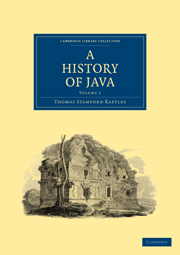Book contents
- Frontmatter
- Preface
- Preface
- Contents
- LIST OF PLATES IN VOLUME I
- Java first visited by the Portuguese
- CHAPTER I
- CHAPTER II
- CHAPTER III
- CHAPTER IV
- CHAPTER V
- CHAPTER VI
- CHAPTER VII
- CHAPTER VIII
- AN ANALYSIS OF THE BRÁTA YÚDHA, OR HOLY WAR, OR RATHER THE WAR OF WOE: AN EPIC POEM, IN THE KÁWI OR CLASSIC LANGUAGE OF JAVA
- Plate section
- Frontmatter
- Preface
- Preface
- Contents
- LIST OF PLATES IN VOLUME I
- Java first visited by the Portuguese
- CHAPTER I
- CHAPTER II
- CHAPTER III
- CHAPTER IV
- CHAPTER V
- CHAPTER VI
- CHAPTER VII
- CHAPTER VIII
- AN ANALYSIS OF THE BRÁTA YÚDHA, OR HOLY WAR, OR RATHER THE WAR OF WOE: AN EPIC POEM, IN THE KÁWI OR CLASSIC LANGUAGE OF JAVA
- Plate section
Summary
Having, in the preceding Chapter, endeavoured to pourtray the natural and moral character of the people of Java, and to convey to the reader a general idea of the nature and principles of the government to which they have been subjected, I shall now proceed to detail some of the usages and customs which prevail among them.
Ceremonies of the Court
Deference paid to superior Rank
Of these the ceremonies of the court are the most obvious, and a stranger cannot fail to be struck with the extreme deference and respect towards their superiors, by which the Javans are characterized. Respect for rank, for experience, for parents and old age, have been already noticed among the features of their character; but the excess to which deference to rank is carried by the political institutions of the country, deserves more particular remark, whether we consider it as illustrative of the nature of the government and the quiet and orderly disposition of the people, or endeavour to trace in the early periods of their history, the causes which may have contributed to the existing constitution of society among them.
The respect shewn to superior rank on Java is such, that no individual, whatever his condition, can stand in the presence of a superior; neither can he address him in the same language in which he is spoken to. Not even the heir apparent, or the members of the royal family, can stand in the presence of the sovereign; and the same restriction applies to the family of each subordinate chief.
- Type
- Chapter
- Information
- A History of Java , pp. 308 - 355Publisher: Cambridge University PressPrint publication year: 2010First published in: 1817



